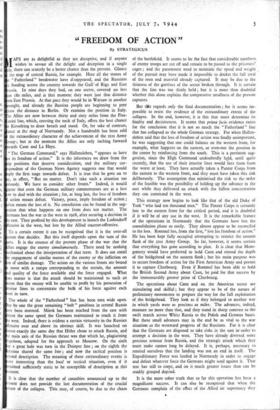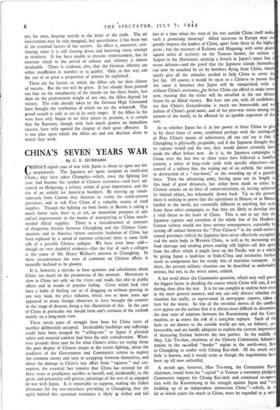" FREEDOM OF ACTION "
By STRATEGICUS
APS are as delightful as they are deceptive, and if anyone wishes to savour all the delight and deception in a single 1p, there can scarcely be a better chance than the present. Glance the map of central Russia, for example. Here all the stones of
e " Fatherland " breakwater have disappeared, and the Russians
e flooding across the country towards the Gulf' of Riga and East ussia. In nine days they had, on one sector, covered no less an 18o miles, and at that moment they were just that distance m East Prussia. At that pace they would be in Warsaw in another rtnight, and already the Russian people are beginning to peer ross the distance to Berlin. Or examine the position in Italy. he Allies are now between thirty and sixty miles from the Pisa- mini line, which, crossing the neck of Italy, offers the best chance Kesselring to draw breath and stand. Or, for sake of contrast, ante at the map of Normandy. Not a hundredth has been told the extraordinary character of the achievement of the 21st Army roup ; but at the moment the Allies are only inching forward wards Caen and La Haye.
" The German Command," says Hallensleben, " appears to have st its freedom of action." It is the inferences we draw from the ap positions that deserve consideration, and the military cor- spondent of the German News Agency suggests one that would ply the first stage towards defeat. .It is true that he goes on to y, in effect, "But no matter. Don't take such a situation too riously. We have to consider other fronts." Indeed, it would pear that even the German military commentators are at a loss w to deal with the situation ; for, at long last, the loss of freedom action means defeat. Victory, peace, imply freedom of action ; feat means the loss of it. No consolation can be found in the sug- stion that what happens on one front does not matter. The ermans lost the war in the west in 1918, after securing a decision in e east. They profited by this development to launch the Ludendorff ensive in the west, but lost by the Allied counter-offensive.
To a certain extent it can be recognised that it is the over-all cure that decides. But this itself depends upon the sum of the rts. It is the essence of the present phase of the war that the Hies engage the enemy simultaneously. There need be nothing echanical about the interpretation of that term. It does not entail
e engagement of similar masses of the enemy or the infliction on of similar damage. The action on the various fronts are bound move with a tempo corresponding to the terrain, the amount
d quality of the force available and the force engaged. What oes matter is that the attack should be maintained to such an tent that the enemy will be unable to profit by his possession of tenor lines to concentrate the bulk of his force against each ont in turn.
The whole of the " Fatherland " line has been torn wide open.
e by one the great remaining " bolt " positions in central Russia ye been stormed. Minsk has been reached from the east with ost the same speed the Germans maintained to reach it from e west. Indeed, there is evident a certain virtuosity in-the Russian ensive over and above its obvious. skill. It was launched on most exactly the same day that Hitler chose to attack Russia, and e main axis of the• Russian thrust was that which he, plagiarising apoleon, .adopted for the approach to Moscow. On the sixth ay a great hole was torn in the Dnieper line ; on the eighth the eresina shared the same fate ; and now the tactical position is vond description: The meaning of these extraordinary events is ore interesting than the local or tactical situation, even if it ained sufficiently static to be susceptible of description at this onion.
It is clear that the number of casualties announced up to the resent does not provide the last documentation of the crucial tore of the collapse. This may, of course, be due to the chaos of the battlefield. It seems to be the fact that considerable numbers, of enemy troops are cut off and remain to be passed to the prisoners' cages ; and the paramount need to maintain the speed and weight of the pursuit may have made it impossible to docket the full total of the men and material already captured. It may be due to the thinness of the garrison of the sector broken through. It is certain that the line was too thinly held ; but it is more than doubtful whether this alone explains the comparative smallness of the present captures.
But this regards only the final documentation ; for it seems im- possible to resist the evidence of the extraordinary extent of the collapse. In the end, however, it is this that must determine its finality and decisiveness. It seems that prima facie. evidence exists for the conclusion that it is not so much the " Fatherland " line that has collapsed as the whole German. strategy. For when Hallen- sleben said that the loss of freedom of action was finally unimportant, he was suggesting that one could balance on the western front, for example, what happens on the eastern, or even-out the position in the centre by reinforcing from the south. This is a pertinent sug- gestion, since the High Command undoubtedly held, until quite recently, that the use of their interior lines would save them from the worst at least. They have actually taken a Panzer Corps from the eastern to the western front, and they must have taken this risk deliberately. The assumption that minimised the risk to the order of the feasible was the possibility of holding up the advance in the east while they delivered an attack with the fullest concentration they can command in the west.
This strategy now begins to look like that of the old Duke of York " who had ten thousand men." The Panzer Corps is certainly lost to the eastern front for the critical period, and it is doubtful if it will-be of any use in the west. It is the remarkable feature of the operations in Normandy that the Germans have lost the consolidation phase so easily. They almost appear to be reconciled to the loss. Rommel has, from the first, " lost his freedom of action." He has been kept fully occupied attempting to restrict the eastern flank of the Mt Army Group. So far, however, it seems certain that everything has gone according to plan. It is clear that Mont- gomery would have preferred to hold Caen and extend the depth of the bridgehead on the eastern flank ; but his main purpose was to secure freedom of action for the First American Army and permit it to capture Cherbourg. Even if Rommel has been able to hold the British Second Army about Caen, he paid for that success by the immeasurably greater prize of Cherbourg.
The operations about Caen and on the American sector are stimulating and skilful ; but they appear to be of the nature of preliminary movements to prepare the way for the full exploitation of ,the bridgehead. They look as if they belonged to another war in which yards were as precious as miles. The advances, indeed, measure no more than that, and they stand in sharp contrast to the swift march across White Russia to the Polish and German bases. But these small advances may in the end be as vital to the war situation as the westward progress of the Russians. For it is clear that the Germans are disposed to take risks in the east in order-to attempt a decision in the west. They have already diverted some precious armour from Russia, and the strategic attack which they must make cannot long be delayed. It is, perhaps, necessary to remind ourselves that the landing was not an end in itself. The Expeditionary Force was landed in Normandy in order to engage and defeat whatever force the Germans might send against it. That test has still to corpe, and on it much greater issues than can be readily grasped depend.
It is the mere sober truth that so far this operation has been a magnificent success. It can also be recognised that when the Germans complain of the effect of the Allied air supremacy they •
are, for once, keeping strictly to the letter of the truth. The air intervention may be only marginal, but nevertheless it has been one of the essential factors of the success. Its effect is, moreover, con- tinuing, since it is still slowing down and harassing every attempt to reinforce. It has been unable to prevent reinforcement, but its constant check to the arrival of armour and infantry is almost invaluable. There is evidence, also, that the German infantry are either insufficient in number or in quality. Only in this way can the use of so great a proportion of armour be explained.
These are the factors on which the Allies rely for their chance of success. But the test will be grave. It has already been pointed out that on the simultaneity of the attacks on the three fronts, less than on the predominant weight of any one, the Allies depend for victory. The risks already taken by the German High Command have brought the retribution of which we are the witnesses. The grand assault is only as yet in its early stages. If the Allies in the west have only begun to set their pieces in position, it is certain that the Russians, though with how much greater an immediate success, have only opened the chapter of their great offensive. It is one plan upon which the Allies act and one decision alone to which they work.



























 Previous page
Previous page